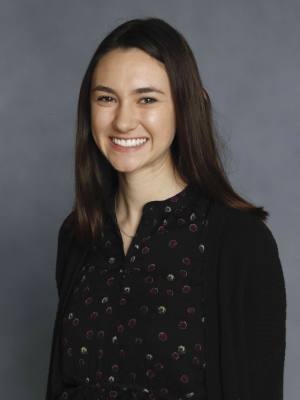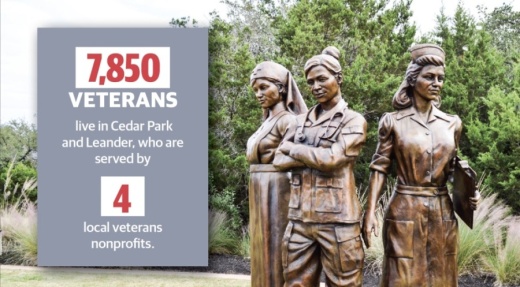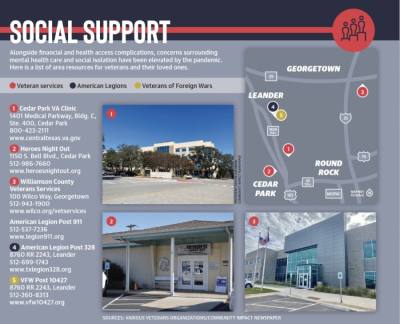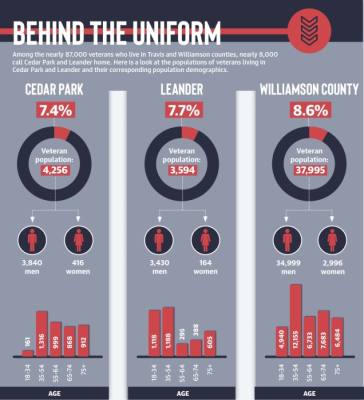On the other end of the line was Williamson County’s coronavirus call center staff, who contacted each of the county’s thousands of veterans. Mitchell said he was asked about his physical safety, financial security and whether he had concerns regarding the pandemic.
“The county was very proactive in reaching out to find out what needs were there and how they could help,” Mitchell said.
While he was personally safe and financially sound, Mitchell said the experience made him reflect on the challenges facing his fellow former service members.
Reaching out in a pandemic
Sherry Golden, director of the Williamson County Veterans Services department—which called all of the county’s veterans in the spring—said the impetus behind those calls was an interest in veterans’ safety. However, through the conversations, Golden said, the focus shifted toward the anxieties veterans had regarding the pandemic.
The call center made about 5,200 outbound calls during its effort to contact veterans in the pandemic. The center also received calls from veterans with COVID-19 questions.
“They were very scared about what was going on,” Golden said.
Williamson County Veterans Services also shifted to phone appointments with veterans to help file possible claims for Veterans Affairs benefits. Appointments totaled 100 per week for about 27 weeks since March, according to the county.
She said many area centers have shifted toward virtual and phone visits only, with limited appointments available.
“Most of my veterans that I’ve been talking to lately said they just simply didn’t go [to their primary care physicians],” Golden said. “I reminded them to please reach out to your doctors, please call the vet center, call the [Veteran Affairs] medical centers—anyone that can help them get to that resource of mental health. But it’s very, very limited.”
‘Veterans are essential’
Local American Legion and Veterans of Foreign Wars posts have struggled financially and socially.
Gilberto Fuentes, the second vice commander at Cedar Park’s American Legion 911 Post, said the largest struggle was keeping relationships and communicating with about 120 members.
They have learned to “adapt and overcome” in all parts of the organization, he said.
Organization updates, calls for volunteers or announcements were mostly given at monthly meetings, which were canceled in the pandemic. Communication, especially for older Post 911 members, became difficult without word-of-mouth transfer, Fuentes said. The post’s “sleepy” website from the ‘90s was revived as a spot for regular communication, and social media was also relied upon.
“That’s what the meeting was for: to socialize, but also pass down information and make sure everyone knows what’s happening,” Fuentes said.
A handful of annual events fund most of the post’s income, he said, so the inability to host in-person fundraisers affected the post financially. In September, a large gala was canceled and replaced with a golf tournament, which could be held outside with social distancing measures.
Veterans of Foreign Wars Post 10427 in Leander estimates it lost over $100,000 in revenue as a result of the coronavirus shutdown and an inability to sell at its canteen—a store that sells food or drinks at a military establishment—or rent its facility. Banquet hall rentals could earn the post $2,400 per weekend. Under the Texas Alcoholic Beverage Commission, veteran posts are classified as a bar, regardless of whether they derive 51% or more of their funding from alcohol sales. The post’s canteen closure also prohibited people meeting on the premises.
“When you’re going to tell veterans that they can’t have their safe place, well, you’re harming a lot of veterans,” said Dave Walden, the post commander.
Walden, a 12-year Army veteran, said the VFW was lucky to be able to continue paying bartenders and staff members, but the forced shutdown of the building was a huge loss. The canteen reopened Sept. 12 under a restaurant permit. The new permit allows operation with the sale of prepackaged food. Facility changes to open as a restaurant cost about $5,000, Walden said.
Meetings for the about 320 members were moved to Zoom for several months, but meetings are now offered with the option of virtual or in person. American Legion Post 328 also meets at the VFW building, so its meeting space was closed for most of the year as well.
Members could not discuss their experiences or post-traumatic stress disorder during the time spent apart, which is the post’s first purpose in its bylaws: “to establish and strengthen camaraderie among its membership,” Walden said.
Despite these losses, Walden, who is also a district commander of 16 VFW posts, said the Leander post is doing far better financially than other posts in Central Texas. He worries that three to four rural posts may shut down.
At the VFW Post 8587 in Georgetown, similar changes such as the closed canteen and limited fundraising events affected the veterans nonprofit organization.
The Georgetown post’s monthly meetings were able to continue in person with social distancing and mask-wearing at their large building, Cmdr. Randy Downing said. Only about half of the 506 members attended the meetings, and he said many members are of a vulnerable age to coronavirus.
“My No. 1 priority was the health of everybody,” Downing said.
The required canteen closure also limited communication and daily meetups among members, most of whom do not use email, Downing said. The canteen reopened in October, and the post “tightened up its belt” in expenses. A Payment Protection Program loan and a Williamson County grant allowed the nonprofit to continue paying its employees and serving its members.
Walden said the state should allow the veterans organizations to bypass the state TABC regulations to fulfill its vital role to other veterans.
“Veterans are essential because no one takes care of veterans like other veterans,” he said.
Kelsey Thompson contributed to this report.







